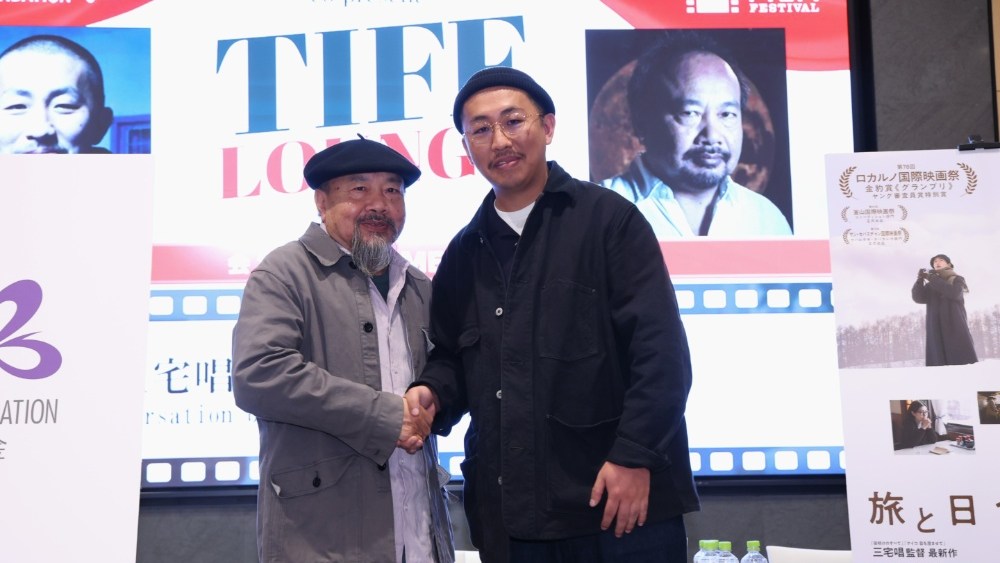At the Tokyo International Film Festival’s TIFF Lounge, two of world cinema’s most distinctive voices — Cambodia’s Rithy Panh and Japan’s Miyake Sho — shared the stage for a conversation about filmmaking, memory, and work. Panh, speaking in French, served as president of the Locarno Film Festival jury that awarded Miyake’s “Two Seasons, Two Strangers” the Golden Leopard earlier this year. Miyake responded in Japanese.
Panh said he was pleased to see Miyake again after Locarno and recalled that the jury had been unanimous. “That doesn’t happen often,” he said. “I don’t usually watch many films, but this one impressed me. It speaks about solitude and the beauty of everyday gestures. When a director places the camera where human grace appears, that’s cinema.”
Miyake said the film was based on stories by manga artist Yoshiharu Tsuge, but that its real focus came from working with contemporary actors. “We can only film them as they are now — their 2025 selves,” he said. “Ten years later, that version of them will be gone. I want to record what can only exist in this moment.”
Panh said the film reminded him of his work in Africa, when he filmed the Dogon people and learned the word dama, meaning divine grace. “In every person there is a light,” he said. “When the camera finds it, we see beauty at every level of human life.”
Miyake thanked him and urged audiences to watch the film in theaters. “It’s a beautiful film,” he said of “Two Seasons, Two Strangers.” “Editing, lighting, acting and time are all in harmony.”
Turning to Panh’s new work “We Are the Fruits of the Forest,” which world premiered in Tokyo, the director described it as “a political film about capitalism’s destruction of nature and communities. It’s about gestures of work, survival and dignity.” He said that for the forest’s ethnic minorities, “the earth, the spirit, the trees, the wind and the sun are vital.” The film, he said, depicts their resistance to the modern economy through the physical acts of labor.
Miyake said those ideas resonated with him and recalled his grandfather in Hokkaido, who had worked as both a farmer and a coal miner. “I wanted to film his hands but never did,” he said. “Your film reminded me of what I lost and why I wanted to film in the first place.”
Both reflected on how viewing habits have changed. “Now everyone watches the small screen,” Panh said. “Each episode lasts about as long as two subway stops.” Miyake added, “We’re not criticizing that format, but what we do is different. We’re making full meals, not snacks.”
Panh said he was planning to shoot his next project on Super 8 film, describing that choice as a protest against the dominance of mini digital formats. “Whether anyone sees it or not, I don’t know,” he said. “If no one watches, maybe I’ll open a fast-food restaurant instead.”
Discussing recurring themes in his own work, Panh said that while he often revisits the Khmer Rouge period, it remains part of his life story. “Cinema saved me,” he said. “I’m the only Cambodian filmmaker who has worked on that memory, but I also keep searching for new cinematic forms and viewpoints.”
When asked about the meaning of work, Miyake said that every kind of labor — even the hardest — had taught him something. “It’s experience more than work,” he said. “Experience shapes us.” Panh said he had worked all his life, sometimes by force, sometimes by choice. “I’ve said I want to stop,” he said. “My wife says, ‘You’ll never stop.’ Maybe she’s right.”
Panh said that teaching cinema was another way of learning. “Empathy — the attention we give to the weakest — is a political act,” he said. “I often get angry. The world isn’t simple. But I try to stay calm and think of something positive every day. That’s my definition of work: to keep learning and to keep hope.”
Miyake said, “I don’t know if anyone will watch my next film. But if one film can still reach someone with empathy, that’s enough reason to continue.”
“Two Seasons, Two Strangers” opens in Japan next week.


AloJapan.com